- Movie critic Roger Ebert appealed to film aficionados and the popcorn-loving masses
- In 1975, Ebert was the first film critic to win a Pulitzer Prize
- His fame ballooned when he hosted a TV show with critic Gene Siskel
- Ebert's legacy is explored in "Life Itself," debuting Sunday, January 4, at 9 p.m. ET on CNN
Explore more about the fascinating world of the late film critic Roger Ebert in the CNN Film "Life Itself," premiering Sunday, January 4, at 9 p.m. ET on CNN.
(CNN) -- There was a time when Roger Ebert was, simply, "the fat one."
When TV viewers first saw Ebert -- whether it was on "Sneak Previews," his and Gene Siskel's national PBS movie review show, or "Siskel & Ebert & the Movies," the widely syndicated version -- they latched on to the look: a slightly rumpled, sweater-vested guy with glasses, paired off with the much taller, balding Siskel (who, of course, was "the bald one").
Never mind the Pulitzer Prize for criticism, which Ebert was the first film critic to win. Never mind the probing interviews with figures such as Kirk Douglas and Burt Reynolds. Never mind the expertise he brought to his job or the no-nonsense attitude he had in offering his critiques.
Most people didn't see that -- until they settled in and watched the two Chicago critics go after each other, debating the finer points of "Blue Velvet" or "Die Hard." It was only then that, perhaps, viewers realized this wasn't just a show about movies.

 The late "thumbs up" film critic Roger Ebert's career is featured in the CNN Film "Life Itself" -- debuting Sunday, Jan. 4 at 9 p.m. ET. In his reviews, Ebert pulled no punches. Click through the photos to see his high praise ... along with some of Ebert's most devastating lines.
The late "thumbs up" film critic Roger Ebert's career is featured in the CNN Film "Life Itself" -- debuting Sunday, Jan. 4 at 9 p.m. ET. In his reviews, Ebert pulled no punches. Click through the photos to see his high praise ... along with some of Ebert's most devastating lines. 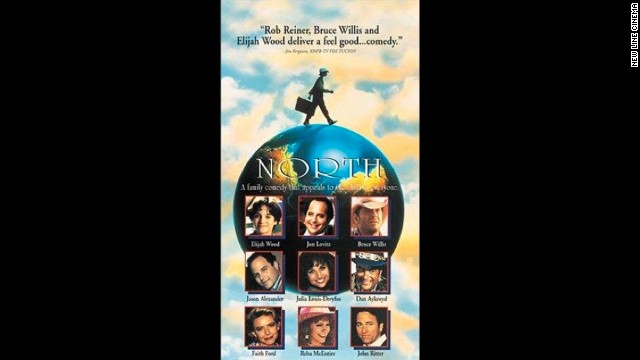 For "North," Ebert wrote perhaps his most negative movie review quote ever: "I hated this movie. Hated hated hated hated hated this movie. Hated it. Hated every simpering stupid vacant audience-insulting moment of it. Hated the sensibility that thought anyone would like it. Hated the implied insult to the audience by its belief that anyone would be entertained by it."
For "North," Ebert wrote perhaps his most negative movie review quote ever: "I hated this movie. Hated hated hated hated hated this movie. Hated it. Hated every simpering stupid vacant audience-insulting moment of it. Hated the sensibility that thought anyone would like it. Hated the implied insult to the audience by its belief that anyone would be entertained by it."  "The craft in this film is rare," Ebert wrote of "Argo," a movie about the Iranian hostage crisis. "It is so easy to manufacture a thriller from chases and gunfire, and so very hard to fine-tune it out of exquisite timing and a plot that's so clear to us we wonder why it isn't obvious to the Iranians." It starred Bryan Cranston and Ben Affleck, who also directed it.
"The craft in this film is rare," Ebert wrote of "Argo," a movie about the Iranian hostage crisis. "It is so easy to manufacture a thriller from chases and gunfire, and so very hard to fine-tune it out of exquisite timing and a plot that's so clear to us we wonder why it isn't obvious to the Iranians." It starred Bryan Cranston and Ben Affleck, who also directed it.  "In the case of Napoleon Dynamite (Jon Heder), I certainly don't like him, but then the movie makes no attempt to make him likable. Truth is, it doesn't even try to be a comedy," wrote Ebert about the popular 2004 film.
"In the case of Napoleon Dynamite (Jon Heder), I certainly don't like him, but then the movie makes no attempt to make him likable. Truth is, it doesn't even try to be a comedy," wrote Ebert about the popular 2004 film.  "Years from now it is quite possible that 'Bonnie and Clyde' will be seen as the definitive film of the 1960s, showing with sadness, humor and unforgiving detail what one society had come to," wrote Ebert. Faye Dunaway and Warren Beatty starred in the title roles.
"Years from now it is quite possible that 'Bonnie and Clyde' will be seen as the definitive film of the 1960s, showing with sadness, humor and unforgiving detail what one society had come to," wrote Ebert. Faye Dunaway and Warren Beatty starred in the title roles.  "Scrooged" with Bill Murray and David Johansen "... was obviously intended as a comedy, but there is little comic about it, and indeed the movie's overriding emotions seem to be pain and anger," Ebert wrote. "You can't bad-mouth 'A Christmas Carol' all the way through and then expect us to believe the good cheer at the end."
"Scrooged" with Bill Murray and David Johansen "... was obviously intended as a comedy, but there is little comic about it, and indeed the movie's overriding emotions seem to be pain and anger," Ebert wrote. "You can't bad-mouth 'A Christmas Carol' all the way through and then expect us to believe the good cheer at the end."  Tom Hanks starred as Valleysman Zachry and Halle Berry starred as Meronym in "Cloud Atlas." Many viewers, including Ebert, found this film to be confusing. But that didn't prevent Ebert from praising it. " ... oh, what a film this is! And what a demonstration of the magical, dreamlike qualities of the cinema. And what an opportunity for the actors. And what a leap by the directors, who free themselves from the chains of narrative continuity."
Tom Hanks starred as Valleysman Zachry and Halle Berry starred as Meronym in "Cloud Atlas." Many viewers, including Ebert, found this film to be confusing. But that didn't prevent Ebert from praising it. " ... oh, what a film this is! And what a demonstration of the magical, dreamlike qualities of the cinema. And what an opportunity for the actors. And what a leap by the directors, who free themselves from the chains of narrative continuity." 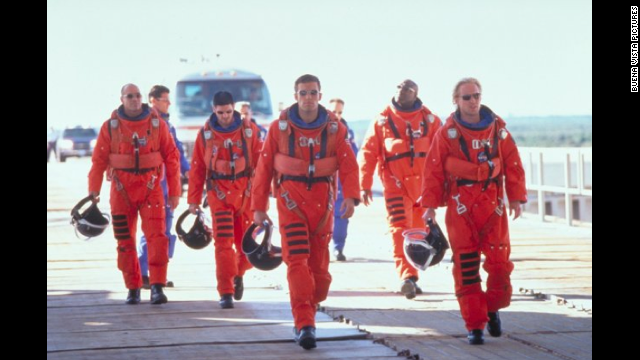 "The movie is an assault on the eyes, the ears, the brain, common sense and the human desire to be entertained," Ebert wrote about the 1998 action/adventure film, "Armageddon." "No matter what they're charging to get in, it's worth more to get out."
"The movie is an assault on the eyes, the ears, the brain, common sense and the human desire to be entertained," Ebert wrote about the 1998 action/adventure film, "Armageddon." "No matter what they're charging to get in, it's worth more to get out."  "And so begins one of the truest, most luminous love stories ever made, Ingmar Bergman's 'Scenes From a Marriage.' The marriage of Johan and Marianne will disintegrate soon after the film begins, but their love will not," wrote Ebert. Erland Josephson and Liv Ullmann played the couple.
"And so begins one of the truest, most luminous love stories ever made, Ingmar Bergman's 'Scenes From a Marriage.' The marriage of Johan and Marianne will disintegrate soon after the film begins, but their love will not," wrote Ebert. Erland Josephson and Liv Ullmann played the couple.  Writing about "Goodfellas," Ebert said, "No finer film has ever been made about organized crime -- not even 'The Godfather,' although the two works are not really comparable." Ray Liotta, here with Gina Mastrogiacomo, starred.
Writing about "Goodfellas," Ebert said, "No finer film has ever been made about organized crime -- not even 'The Godfather,' although the two works are not really comparable." Ray Liotta, here with Gina Mastrogiacomo, starred.  For "Being John Malkovitch," Ebert suggested that the "movie has ideas enough for half a dozen films, but (Director Spike) Jonze and his cast handle them so surely that we never feel hard-pressed; we're enchanted by one development after the next." Catherine Keener and John Cusack starred.
For "Being John Malkovitch," Ebert suggested that the "movie has ideas enough for half a dozen films, but (Director Spike) Jonze and his cast handle them so surely that we never feel hard-pressed; we're enchanted by one development after the next." Catherine Keener and John Cusack starred. 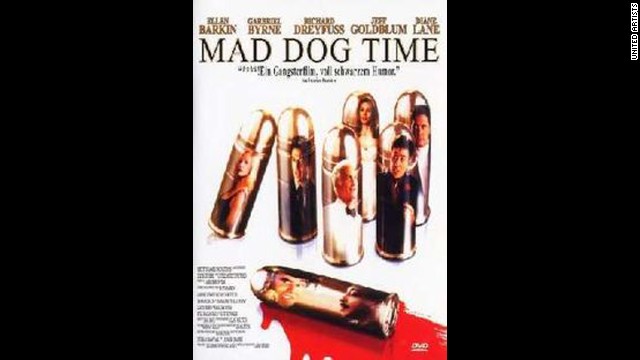 "'Mad Dog Time' is the first movie I have seen that does not improve on the sight of a blank screen viewed for the same length of time," Ebert wrote. "Oh, I've seen bad movies before. But they usually made me care about how bad they were."
"'Mad Dog Time' is the first movie I have seen that does not improve on the sight of a blank screen viewed for the same length of time," Ebert wrote. "Oh, I've seen bad movies before. But they usually made me care about how bad they were."  "Minority Report" Director Steven Spielberg is "a master filmmaker at the top of his form, working with a star, Tom Cruise, who generates complex human feelings even while playing an action hero," Ebert wrote. "... This film is such a virtuoso high-wire act, daring so much, achieving it with such grace and skill. 'Minority Report' reminds us why we go to the movies in the first place."
"Minority Report" Director Steven Spielberg is "a master filmmaker at the top of his form, working with a star, Tom Cruise, who generates complex human feelings even while playing an action hero," Ebert wrote. "... This film is such a virtuoso high-wire act, daring so much, achieving it with such grace and skill. 'Minority Report' reminds us why we go to the movies in the first place."  "'Deuce Bigalow: European Gigolo' makes a living prostituting himself. How much he charges I'm not sure, but the price is worth it if it keeps him off the streets and out of another movie." Rob Schneider played the title role.
"'Deuce Bigalow: European Gigolo' makes a living prostituting himself. How much he charges I'm not sure, but the price is worth it if it keeps him off the streets and out of another movie." Rob Schneider played the title role.  Kevin Costner, center, played district attorney Jim Garrison with Michael Rooker, and Jay O. Sanders in "JFK," directed by Oliver Stone. "I have no opinion on the factual accuracy of his 1991 film 'JFK.' I don't think that's the point. This is not a film about the facts of the assassination, but about the feelings. ... 'JFK' is a masterpiece." ... it "is a brilliant reflection of our unease and paranoia, our restless dissatisfaction."
Kevin Costner, center, played district attorney Jim Garrison with Michael Rooker, and Jay O. Sanders in "JFK," directed by Oliver Stone. "I have no opinion on the factual accuracy of his 1991 film 'JFK.' I don't think that's the point. This is not a film about the facts of the assassination, but about the feelings. ... 'JFK' is a masterpiece." ... it "is a brilliant reflection of our unease and paranoia, our restless dissatisfaction." 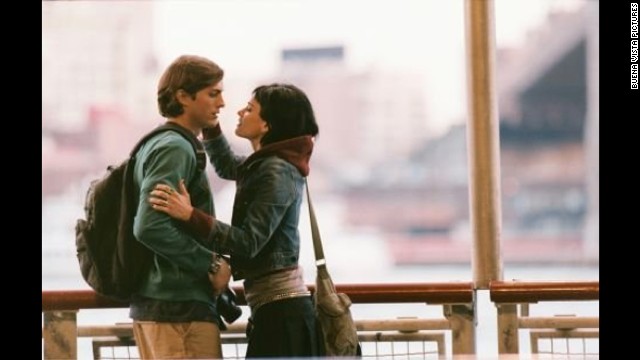 After seeing "A Lot Like Love," Ebert wrote: "Judging by their dialogue, Oliver and Emily have never read a book or a newspaper, seen a movie, watched TV, had an idea, carried on an interesting conversation or ever thought much about anything. The movie thinks they are cute and funny, which is embarrassing, like your uncle who won't stop with the golf jokes." Ashton Kutcher and Amanda Peet were Oliver and Emily.
After seeing "A Lot Like Love," Ebert wrote: "Judging by their dialogue, Oliver and Emily have never read a book or a newspaper, seen a movie, watched TV, had an idea, carried on an interesting conversation or ever thought much about anything. The movie thinks they are cute and funny, which is embarrassing, like your uncle who won't stop with the golf jokes." Ashton Kutcher and Amanda Peet were Oliver and Emily. 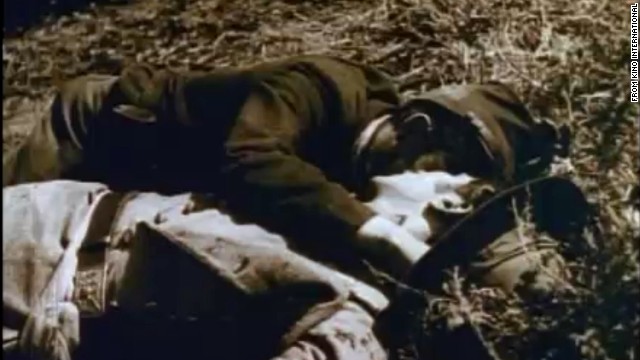 "Certainly 'Birth of a Nation' is a film of great visual beauty and narrative power," Ebert wrote in 2003. However, he wrote that the film is "unapologetic about its attitudes, which are those of a white Southerner, raised in the 19th century, unable to see African-Americans as fellow beings of worth and rights." ... is it "possible to separate the content from the craft? ... If we are to see this film, we must see it all, and deal with it all."
"Certainly 'Birth of a Nation' is a film of great visual beauty and narrative power," Ebert wrote in 2003. However, he wrote that the film is "unapologetic about its attitudes, which are those of a white Southerner, raised in the 19th century, unable to see African-Americans as fellow beings of worth and rights." ... is it "possible to separate the content from the craft? ... If we are to see this film, we must see it all, and deal with it all."  "The Usual Suspects" -- with Kevin Pollak, Stephen Baldwin, Benicio del Toro, Gabriel Byrne and Kevin Spacey -- won an Academy Award for Best Original Screenplay, by Christopher McQuarrie. Nonetheless, Ebert didn't like it. "I prefer to be amazed by motivation, not manipulation."
"The Usual Suspects" -- with Kevin Pollak, Stephen Baldwin, Benicio del Toro, Gabriel Byrne and Kevin Spacey -- won an Academy Award for Best Original Screenplay, by Christopher McQuarrie. Nonetheless, Ebert didn't like it. "I prefer to be amazed by motivation, not manipulation."  How could Hollywood go wrong with a movie starring comedy kingpins Martin Short, Steve Martin and Chevy Chase? Ebert's answer: "Three Amigos." "This movie is too confident, too relaxed, too clever to be really funny."
How could Hollywood go wrong with a movie starring comedy kingpins Martin Short, Steve Martin and Chevy Chase? Ebert's answer: "Three Amigos." "This movie is too confident, too relaxed, too clever to be really funny." 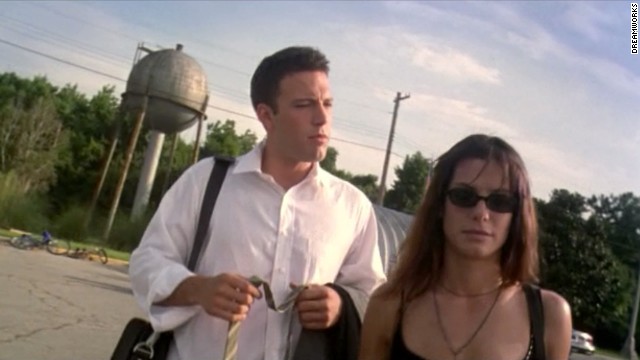 The pairing of Ben Affleck and Sandra Bullock in "Forces of Nature" failed to impress Ebert. "The movie is a dead zone of boring conversations, contrived emergencies, unbelievable characters and lame storytelling."
The pairing of Ben Affleck and Sandra Bullock in "Forces of Nature" failed to impress Ebert. "The movie is a dead zone of boring conversations, contrived emergencies, unbelievable characters and lame storytelling." 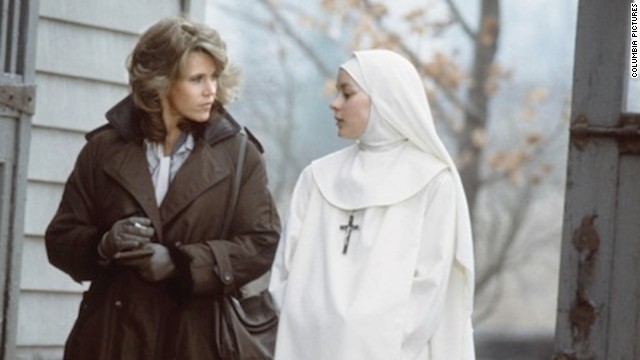 The Academy Award-nominated "Agnes of God," starring Jane Fonda and Meg Tilly received a one-star review from Ebert: "It considers, or pretends to consider, some of the most basic questions of human morality and treats them on the level of 'Nancy Drew and the Secret of the Old Convent.'"
The Academy Award-nominated "Agnes of God," starring Jane Fonda and Meg Tilly received a one-star review from Ebert: "It considers, or pretends to consider, some of the most basic questions of human morality and treats them on the level of 'Nancy Drew and the Secret of the Old Convent.'"  Ebert called the popular teen sex comedy "Fast Times at Ridgemont High" a "scuz-pit of a movie." "... the makers of 'Fast Times at Ridgemont High' have an absolute gift for taking potentially funny situations and turning them into general embarrassment."
Ebert called the popular teen sex comedy "Fast Times at Ridgemont High" a "scuz-pit of a movie." "... the makers of 'Fast Times at Ridgemont High' have an absolute gift for taking potentially funny situations and turning them into general embarrassment." 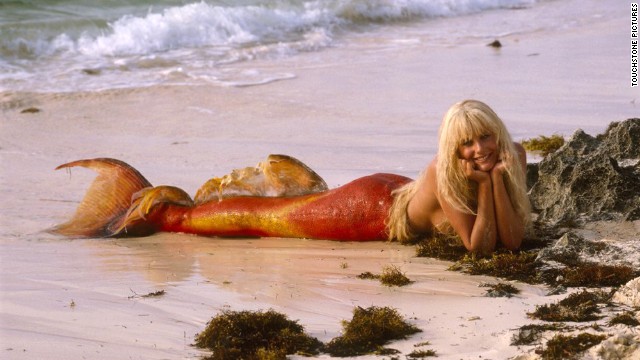 The romantic comedy "Splash" co-starred Daryl Hannah as a mermaid. "It's too bad the relentlessly conventional minds that made this movie couldn't have made the leap from sitcom to comedy."
The romantic comedy "Splash" co-starred Daryl Hannah as a mermaid. "It's too bad the relentlessly conventional minds that made this movie couldn't have made the leap from sitcom to comedy."  Before his death in 2013, Ebert wore a prosthesis after losing much of his jaw to thyroid cancer. During his career Ebert wrote thousands of movie reviews and, with Gene Siskel, co-hosted the iconic TV show "Siskel and Ebert At The Movies." Siskel died in 1999 after battling a brain tumor. Explore the fascinating world of Roger Ebert in the CNN Film "Life Itself" -- debuting Sunday, Jan. 4 at 9 p.m. ET.
Before his death in 2013, Ebert wore a prosthesis after losing much of his jaw to thyroid cancer. During his career Ebert wrote thousands of movie reviews and, with Gene Siskel, co-hosted the iconic TV show "Siskel and Ebert At The Movies." Siskel died in 1999 after battling a brain tumor. Explore the fascinating world of Roger Ebert in the CNN Film "Life Itself" -- debuting Sunday, Jan. 4 at 9 p.m. ET. OUCH: Roger Ebert pulled no punches
Fail: 'Napoleon Dynamite' (2004)
Gem: 'Bonnie and Clyde' (1967)
Gem: 'Cloud Atlas' (2012)
Fail: 'Armageddon' (1998)
Gem: 'Scenes From a Marriage' (1974)
Gem: 'Being John Malkovich' (1999)
Fail: 'Mad Dog Time' (1996)
Gem: 'Minority Report' (2004)
Fail: 'Deuce Bigalow: European Gigolo' (2005)
Fail: 'A Lot Like Love' (2005)
Gem: 'Birth of a Nation' (1915)
Fail: 'The Usual Suspects' (1995)
Fail 'Three Amigos' (1986)
Fail: 'Forces of Nature' (1999)
Fail: 'Agnes of God' (1985)
Fail: 'Fast Times at Ridgemont High' (1982)
 Ebert's movie gems ... and fails
Ebert's movie gems ... and fails  'They had chemistry you can't buy'
'They had chemistry you can't buy'  Roger Ebert, trailblazer
Roger Ebert, trailblazer  Richard Roeper: Glad Ebert is at peace
Richard Roeper: Glad Ebert is at peace  Ebert was mayor of 'Movie Criticville'
Ebert was mayor of 'Movie Criticville' It was also a show about movie reviewing, movie embracing, movieGOING. A shared awe and love of pictures projected in the dark.
And that was Ebert's genius. (Siskel, who died in 1999, should get some credit, too. The pair's chemistry was integral to the show's spirit.)
They reveled in film in ways that appealed to the aficionados -- folks who knew who Andrew Sarris and Pauline Kael were -- and to the masses, popcorn-loving audiences who didn't care so much about art as wanting to be entertained for two hours.
But well before "Sneak Previews" and well after Siskel's death, Ebert reveled in film and shared his enthusiasm with others. In 1967, when he was hired as the Chicago Sun-Times' movie critic, he hadn't yet turned 25 but sounded like a film veteran.
A generation later, when the Internet came calling, he was all over it, developing his own website, tweeting incessantly, sounding off in one format or another. He made his site a home for young movie enthusiasts and ran reviews from "far-flung correspondents."
He invited comments and, perhaps surprisingly, rarely had to deal with trolls. By loving conversation, he made sure the dialogue was always respectful. Trolls and fanboys went elsewhere to vent.
It's not that he wasn't opinionated. His arguments with Siskel -- and later with Richard Roeper -- testify to that. One of his books was titled "I Hated, Hated, Hated This Movie." Another was "Your Movie Sucks."
But even the emotion was less about anger than disappointment, a sense of "how dare you." He knew how hard it was to make a movie; after all, he'd written the script for a couple, including "Beyond the Valley of the Dolls," and went out of his way to praise small performances and little-known filmmakers. A film that didn't try was more than a waste of time. It was an offense.
"(I) hated the implied insult to the audience by its belief that anyone would be entertained by it," he wrote about "North."
"I've seen bad movies before. But they usually made me care about how bad they were," he wrote about a film called "Mad Dog Time."
Not even cancer, which forced the removal of his lower jaw and eventually took his life, could tamp down his energy.
As he watches a movie, "Ebert scribbles constantly, his pen digging into page after page, and then he tears the pages out of his notebook and drops them to the floor around him. Maybe 20 or 30 times, the sound of paper being torn from a spiral rises from the aisle seat in the last row," Chris Jones wrote in a 2010 Esquire profile. "The lights come back on. Ebert stays in his chair, savoring, surrounded by his notes. It looks as though he's sitting on top of a cloud of paper."
Watching movies has been compared to waking dreams: the darkness, the colors, the sense of being immersed in another world. More than once, Ebert wrote about the experience of seeing films as a reverie and escape. Few were better at conveying that sense to those outside the theater.
And that cloud? One can see him there, a man among the mist, lost in the light.
No comments:
Post a Comment